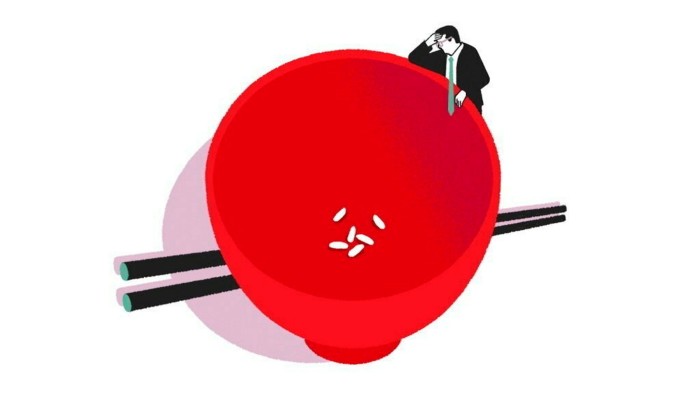Unlock the Editor’s Digest for free
Roula Khalaf, Editor of the FT, selects her favourite stories in this weekly newsletter.
When you are the Japanese minister of agriculture and millions of citizens conditioned from birth to revere rice are agonising over record-high prices and depleted supermarket shelves, you have a couple of choices.
You could reassure them that their pain is fully recognised at the highest levels of government, that effective relief measures will kick in soon and that fundamental reform is being rushed through to redress decades of misguided policy. Or you could boast, in the manner of Scarface sprawled in his mansion, about the ampleness of your personal rice stash, your surplus large enough to be sold and the political gifts that built your mountain of white stuff.
Taku Eto, the farm minister, went with the latter choice at a weekend fundraiser. And, after rapidly winning the hostility of everyone who pays for rice themselves, he was gone from his post by Wednesday. “I have never bought rice, to be honest, because my supporters give me a lot of rice. I have so much rice in my pantry that I could sell it,” was the precise formula that sealed Eto’s fate.
At a glance, “ricegate” rings familiar with endless tone-deaf Japanese political blunders over the years. But the timing and the crisis of empathy this lays bare make it unusually revealing and disastrous. And, remarkably, it was only the second-worst rice-themed head-smacker from a Japanese politician over the past few weeks. The line from Prime Minister Shigeru Ishiba on US tariff negotiations — “I won’t sacrifice the rice industry to protect the car industry” — may have triggered fewer klaxons, but was in its substance more alarming.
To take Eto’s comments first, the problem is not the boast per se, but the implied failure of the Ishiba cabinet to treat the disorienting, inflationary daily experience of ordinary Japanese as the watershed mind-bender it truly is. Rapidly rising prices can be politically ruinous anywhere; in Japan, where they follow roughly 20 years of stagnant or falling prices and moribund wages, their potency is even greater.
When the financial year ended in March, Japan had completed its 36th straight month with headline inflation above the Bank of Japan’s 2 per cent target. Inflation-adjusted wages fell in each of the first three months of 2025. The word “normalisation” — beloved of monetary policymakers — doesn’t capture just how wrenchingly abnormal all this feels for the average household.
And, highlighting that sense of the uncanny, average rice prices have doubled since this time last year, the national strategic rice reserves have been tapped due to distribution issues for the first time ever, and still shoppers have repeatedly experienced temporary shortages of a grain that remains central to the Japanese diet and mindset.
Behind the price surge, say some experts, are decades of policy that incentivised farmers to plant less rice as a means of supporting prices. Ishiba’s LDP was the same party that stuck to that plan, rather than encouraging Japan to become a global rice exporting superpower. The fact that the same policy was accompanied by market access limitations on foreign rice imports has supplied an awkwardly timed reminder of why Donald Trump is so convinced of the historic iniquities of Japanese protectionism.
But arguably more damning for Ishiba were his comments flatly dismissing the idea that Japan should consider offering greater market access for American rice as an inducement to the Trump administration to spare Japan from the current 25 per cent tariff on automotive imports.
The comment was perhaps an attempt by Ishiba to assert his man-of-the-people credentials and his unwavering backing for the farming vote — upon which the LDP has so long depended. What it actually does, though, is reveal a leader who has entirely missed where Japan’s real crisis lies. It is fine to be emotionally defensive around a precious grain, and sensible to be protective of food security in geopolitically and environmentally tormented times. But farming employs roughly a quarter of the number of Japanese who owe their jobs in some form to the automotive industry, which produces by far the country’s most important export.
Greater even than the car industry’s importance as a generator of revenue is its centrality as a propellant of innovation, competitiveness, risk-taking and productivity — the only qualities, realistically, that stand to see Japan through a demographic crisis and Trump’s forcible rewriting of global rules. Rice can, and should, be sacrificed if that is what it takes. And if shortages do persist, we all know an ex-minister with plenty to spare.
